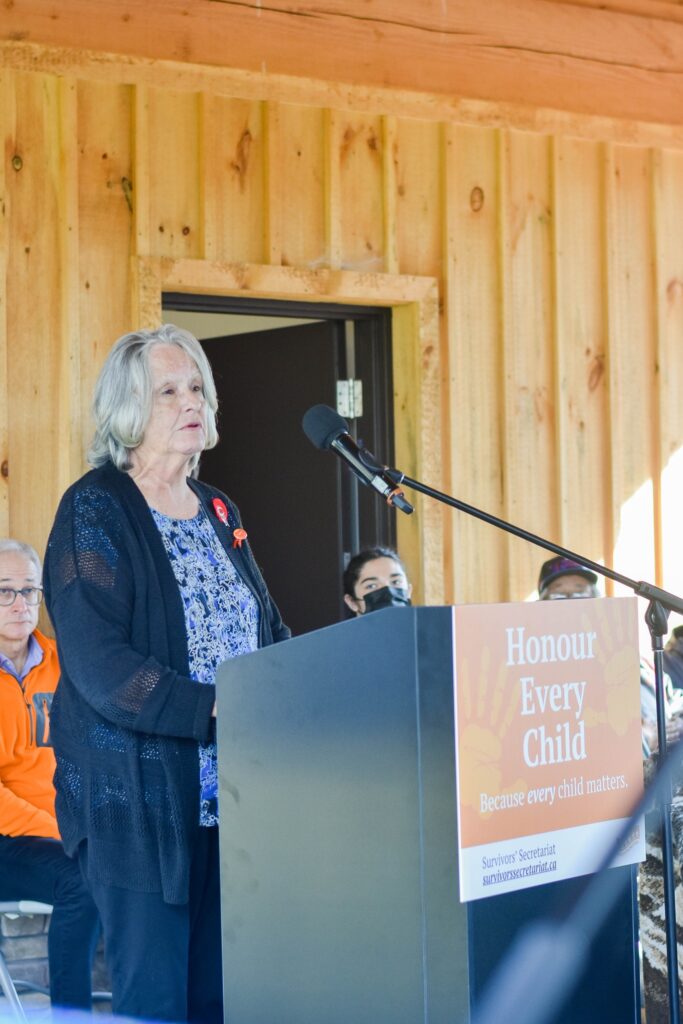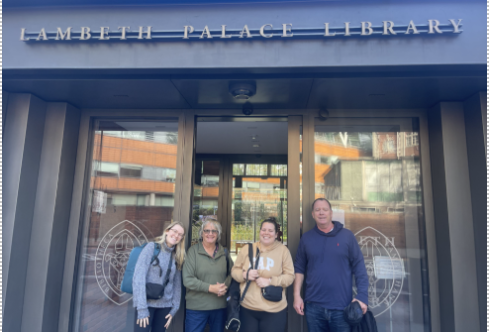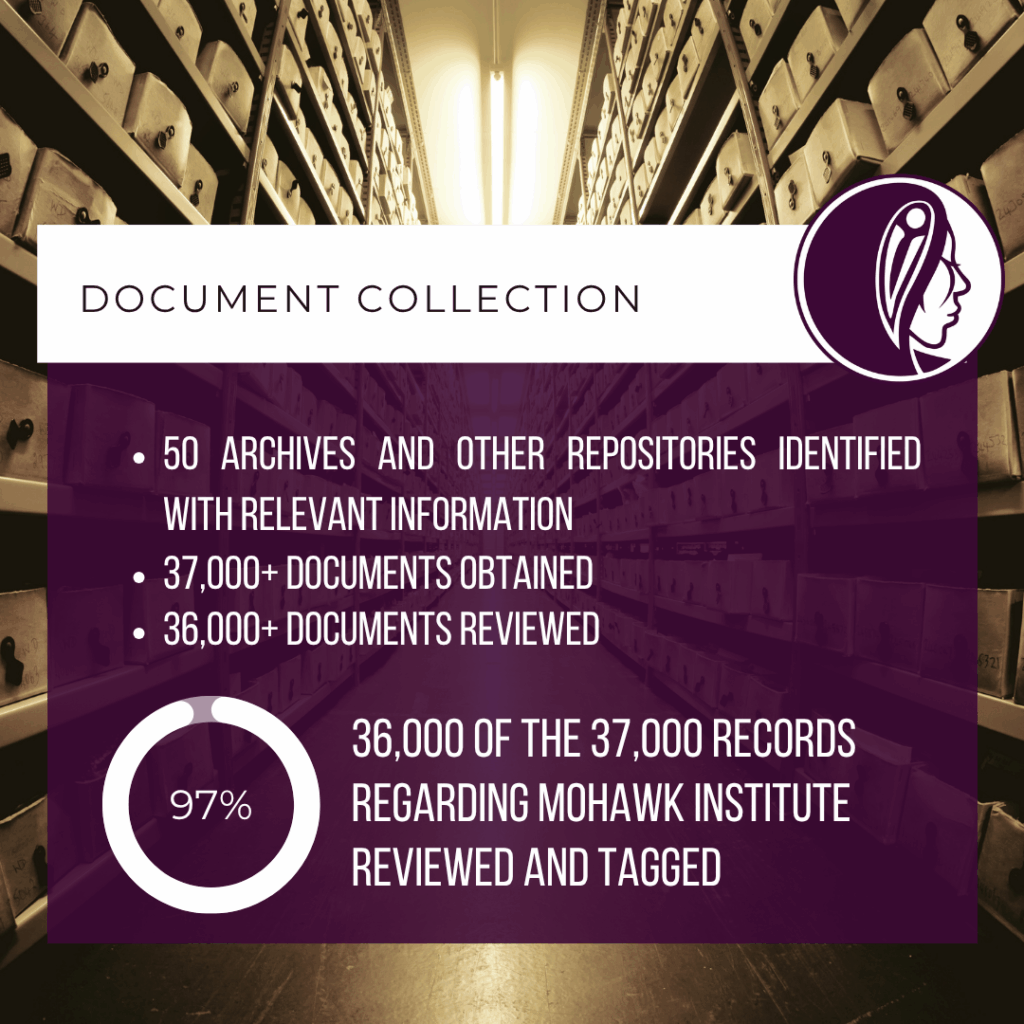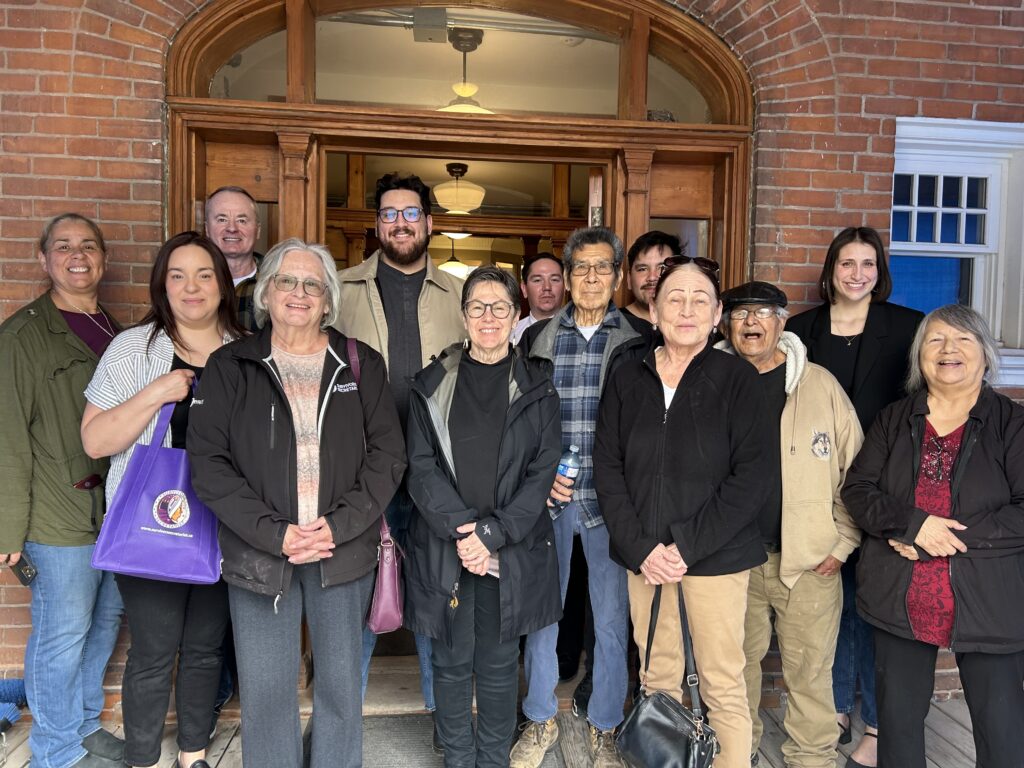The Survivors’ Secretariat, established by Survivors of the Mohawk Institute Indian Residential School in 2021, advocates for the release of essential records related to the Indian Residential School (IRS) system. The Mohawk Institute, also known as the “Mush Hole,” was the longest continuously operating Indian Residential Schools in Canada, and its legacy still impacts Indigenous communities today. Survivors, their families, and their communities continue to seek answers. Records and documents are vital to uncovering the truth about the abuse, deaths, and disappearances that occurred within these institutions, yet Survivors encounter obstacles at every turn.
It is alarming that despite the findings of the Truth and Reconciliation Commission of Canada (TRC) and a decade of public promises the federal government of Canada still withholds crucial documents tied to the Indian Residential School system. Despite legal obligations under the 2006 Indian Residential School Settlement Agreement, many records remain beyond the reach of communities and organizations like our own.
The Office of the Special Interlocutor’s (OSI) Interim Report, (page 65) states that between 1936 and 1944 Canada destroyed 15 tons of paper documents, including 200,000 Indian Affairs files. The destruction of these records impacts our ability to trace the histories of children who attended IRS like the Mohawk Institute; as many records were either lost or deliberately destroyed.
The loss of these documents underscores the importance of continuing to advocate for the preservation and release of all remaining Indian Residential School (IRS) records. Without access to these documents, Indigenous Survivors, families, communities, and future generations are left without answers – answers that may be held within these records. A full and proper investigation risks being incomplete or insufficient without them.
In April 2025, the federal government was selected for the Code of Silence for Outstanding Achievement in Government Secrecy for withholding IRS records. The award highlights government or publicly funded agencies that go to great lengths to conceal information the public is entitled to under access to information laws.
It is imperative that the Canadian federal government ensures Indigenous Survivors and communities have access to the information, history, and truths contained in these documents, so they can reclaim and own their history. The government must fulfill its legal obligations to provide full transparency and access to all records related to the IRS system. Sadly, this is not the current reality.
In this blog, we will explore the ongoing issues surrounding access to Indian Residential School records, the efforts of the Survivors’ Secretariat to gain access to records, and secure essential resources needed to review, house and preserve this history. We will share the findings of the Standing Senate Committee on Indigenous Peoples’ report, Missing Records, Missing Children, released in July 2024, which outlines the continuing challenges faced by Survivors and communities in accessing records related to Indian Residential Schools.
The Role of the Survivors' Secretariat
The Mohawk Institute (1828–1970), located in Brantford, Ontario, was the longest continuously operating Indian Residential School in Canada. It was owned by the New England Company, also known as the Society for the Propagation of the Gospel in New England and operated with significant involvement from the Anglican Church of Canada, particularly the Diocese of Huron.
In May 2022, Brantford City Council unanimously passed a motion, making its files and records accessible to the Secretariat, urging the federal and provincial governments, as well as the Anglican Church, to release all documents pertaining to the former Mohawk Institute to the Survivors’ Secretariat. Similar motions have since been passed by three additional municipalities.

Working with Know History Historical Services since 2021, the Secretariat has committed more than 37,000 person hours of research to identify 6,200 names of children who attended the Mohawk Institute and 2,100+ names of individuals who worked there. Additionally, the Secretariat has identified over 105 deaths connected to the Institute, more than double the number initially reported by the NCTR. We are now working with the Chief Coroner of Ontario to deepen our investigation into each death we have uncovered.
In 2021, the Survivors’ Secretariat negotiated a Memorandum of Understanding (MOU) to access the 14,000+ records held by the University of Manitoba’s National Centre of Truth and Reconciliation (NCTR) database. However, the Secretariat is not able to share these records with impacted communities or next of kin because of the limitations of our agreement with the TRC. These records do not include the 24.1 million documents held by 13 federal departments of the Canadian Government announced in 2023 relating to Indian Residential Schools operated by Canada.

In 2023, after discussions with Reverand Canon Paul Wright (Sub-Dean of the Chapel Royal) and Deputy Clerk of the Closet (the only full-time clerical member of the Royal Household of the United Kingdom,) the Secretariat travelled to England to access records held at the Palace Archives at Lambeth Library, the Metropolitan Museum and the National Archives. The primary focus of the trip was to scan documents related to the New England Company’s involvement in the operation of the Mohawk Institute.
Additionally, many records relevant to the Mohawk Institute are still held by the Anglican Church and the New England Company whose archives are primarily held in England. Not only are records scattered across multiple jurisdictions and throughout various organizations, locating them often requires physical searching through vast amounts of paper archives, an extremely costly and time-consuming process.

Our aim is to identify every child who attended the Mohawk Institute, including those who are missing or remain unaccounted for. This is slow, painstaking work, and it highlights the urgent need for comprehensive record-keeping that links our archival and ground search research work in ways that matter on the ground and in our identification of the children.
The Secretariat wants to preserve all records and relevant information related to the institute and eventually make them available to Survivors and their families through the development of a Mohawk Institute Community Archive. Public access is not yet available, as this work still requires significant progress in Indigenous Data Sovereignty and Indigenous Data Governance to ensure the Secretariat has access and control of records so we can return the memories of every child to their home community.
A lack of sustained federal funding has significantly slowed this work. During the Secretariat’s initial three-year funding agreement with Crown-Indigenous Relations and Northern Affairs Canada (CIRNAC), we had more than 16 full-time researchers, who collectively contributed 36,000 hours dedicated to archival research.
As of December 2024, the Secretariat has had to pause its contract with Know History and is now operating with one in-house Data Librarian/Researcher. Our Data Librarian/Researcher is now responsible for managing inquiries, overseeing records, and coordinating the migration of data into a new community database. However, due to the cut to our federal funding for the 2024/2025 fiscal year, all archival research work has been paused.

Addressing Challenges in Record Collection
In July 2024, the Standing Senate Committee on Indigenous Peoples released the report titled Missing Records, Missing Children. Here are some key recommendations from the Senate Report:
Prioritize Mediation Over Litigation: The report urges Canada to adopt a policy of proactive record disclosure and prioritize negotiation over litigation.
Address Legal and Procedural Barriers: The report calls for removing legal barriers for records access, ensuring Indigenous communities can obtain information about their histories.
Improve Records Management: The committee emphasizes the importance of implementing standardized practices for record-keeping, digitization, and archiving to facilitate easier access and preservation of documents.
Ensure Transparency and Accountability: The committee emphasizes the importance of providing clear guidance to government offices on terminology and access rules to improve public access to records.
Provide Support for Indigenous Led Initiatives: The report recommends funding Indigenous-led efforts to recover IRS records across jurisdictions, empowering communities to preserve their histories
Address emotional and psychological impacts: The committee recognizes the emotional impact on Survivors and their families and recommends providing support services throughout the truth-seeking process.
In April 2025, Senator Kim Pate traveled to our office, where she met with the Board of Directors and staff. The visit underscored the ongoing challenges Survivors face in obtaining access to records needed in our work to find the missing and disappeared children. Senator Pate toured the former Mohawk Institute site, which continues to serve as a site of memory and commemoration for Survivors and their families. During her visit, discussions centred around the need for increased federal support for community-led initiatives and advocacy for the full release of Indian Residential School records.
Moving Forward
As we move forward in our journey of Truth and Reconciliation, the Survivors’ Secretariat remains dedicated to uncovering the full truth of the Mohawk Institute during its 140+ years of operation. Despite public apologies and cooperation from institutions like the Anglican Church, critical records remain scattered, restricted, or entirely inaccessible, delaying closure for Survivors, families and communities still searching for answers about disappeared children and unmarked graves.
The Survivors’ Secretariat continues to call on religious and state institutions to meet their moral and legal responsibilities to release all records relevant to the Mohawk Institute to the Survivors’ Secretariat. These records are essential to uncovering the truth about a long, and systemic history of genocide. Full access is essential not only to support the search and recovery of unmarked burials and missing children, but also to affirm the rights of Indigenous Peoples to know the truth and to protect against the repetition of state-sanctioned human rights atrocities.
The continued efforts of Survivors, advocates, and community leaders are vital to ensuring that the truth is brought to light, and that the legacy of the Indian Residential School system is fully understood. Together, we must continue to advocate for transparency and accountability from all entities involved in the Indian Residential School system and push for the release of records that are essential to truth and reconciliation.